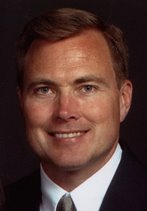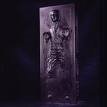 This morning during a Bible class on Acts 11, my pastor mentioned that the first century church had to deal with 'loose cannons' -- those who traveled around the country preaching a variety of doctrines. One person subsequently asked him how the Office of Holy Ministry protects God's people from the 'loose cannons' of our own day. Here is his answer:
This morning during a Bible class on Acts 11, my pastor mentioned that the first century church had to deal with 'loose cannons' -- those who traveled around the country preaching a variety of doctrines. One person subsequently asked him how the Office of Holy Ministry protects God's people from the 'loose cannons' of our own day. Here is his answer:Bible Class Soundbite:
"Loose Cannons" (7.5 minutes)
"Loose Cannons" (7.5 minutes)
Note the size of the rope in the above picture that holds that cannon in place, guarding against the danger of hundreds of pounds rolling or even tumbling toward sailors while at sea. The expression 'loose cannon' intrigued me, so I looked it up online:
"...an irresponsible and reckless individual whose behaviour (either intended or unintended) endangers the group he or she belongs to. The term originates in the Age of Sail, and wooden men-of-war. When a storm began, all cannons had to be securely fastened and tied in place; otherwise, they would roll uncontrollably around the deck, causing havoc. A loose cannon, weighing hundreds of kilograms, would crush anything and anyone in its path, and possibly even break a hole in the hull, thus endangering the seaworthiness of the whole ship..." -Wikipedia.orgThere have always been loose cannons among God's people, folks like Korah, who also had to be 'tied down' by God, in a rather frightful way:
"Korah son of Izhar, the son of Kohath, the son of Levi, and certain Reubenites—Dathan and Abiram, sons of Eliab, and On son of Peleth—became insolent and rose up against Moses. With them were 250 Israelite men, well-known community leaders who had been appointed members of the council. They came as a group to oppose Moses and Aaron and said to them, 'You have gone too far! The whole community is holy, every one of them, and the LORD is with them. Why then do you set yourselves above the LORD's assembly?' When Moses heard this, he fell on his face. [...] The ground that was under them split open; and the earth opened its mouth and swallowed them up, and their households, and all the men who belonged to Korah with their possessions. So they and all that belonged to them went down alive to Sheol; and the earth closed over them, and they perished from the midst of the assembly. " (Numbers 16:1-4, 31-33)
 The Reformation saw the likes of Korah in folks like Thomas Münzer, and sadly, there are also many today who rise up against the called and ordained servants of the Lord in the Office of Holy Ministry, even in Lutheran churches, and say the very same things. Without being called and ordained, they rise up in rebellion. At times, Korah really does sound like a baby-boomer.
The Reformation saw the likes of Korah in folks like Thomas Münzer, and sadly, there are also many today who rise up against the called and ordained servants of the Lord in the Office of Holy Ministry, even in Lutheran churches, and say the very same things. Without being called and ordained, they rise up in rebellion. At times, Korah really does sound like a baby-boomer.So if folks like Korah might be called loose cannons, what would those ropes be in the 'ship' of Christ's Church?
As a Lutheran laymen with a family that I very much want protected from being rolled over by 500 pound cannons, I look first to Article 14 of the Augsburg Confession: "Of Ecclesiastical Order they teach that no one should publicly teach in the Church or administer the Sacraments unless he be regularly called."
Martin Chemnitz also adds:
It is true that all Christians have a general call to proclaim the Gospel of God, Romans 10:9, to speak the Word of God among themselves, Eph. 5:19; to admonish each other from the Word of God, Col. 3:16; to reprove, Eph. 5:11 [and] to comfort, 1 Th. 4:18. And family heads are enjoined [to do] this with the special command that they give their households the instruction of the Lord. Eph 6:4. But the public ministry of the Word and of the Sacraments in the church is not entrusted to all Christians in general, as we have already shown, 1 Co 12:28; Eph 4:12. For a special or particular call is required for this, Ro 10:15. [p. 29, Ministry, Word, and Sacraments: An Enchiridion]
 The rope which holds cannons in place that might otherwise damage or even sink a church is indeed found in Article 14; this rope firmly secures hundreds of pounds of enthusiast cannon, as we believe, teach, and confess its truth.
The rope which holds cannons in place that might otherwise damage or even sink a church is indeed found in Article 14; this rope firmly secures hundreds of pounds of enthusiast cannon, as we believe, teach, and confess its truth.In these dark days, how cool is that God not only told us where we would find His spirit (in the external Word and Sacrament), but he also points us to this divinely appointed office through which we may confidently receive them!
May God continue to protect my family, your family, and all of us from latter-day Korahs, Thomas Münzers, or in other words, the innumerable loose cannons of our day!
TUEBOR!










1 comment:
Interesting post. Interesting analogy. I recall reading a short story (perhaps it was Rudyard Kipling) about a man on a ship who brought a loose cannon under control. The captain executed this because he was the seaman who had the responsibility of keeping the cannon secure in the first place.
At any rate, if a man is responsible for allowing a loose cannon he dies. It recalls the Biblical words that if anyone offend one of these little ones, it were better than a millstone be hanged around his neck and he be drowned in the sea.
I am not Anonymous. I just can't jump through the hoops right. Norman Teigen (Norman'sdemesne)
Post a Comment